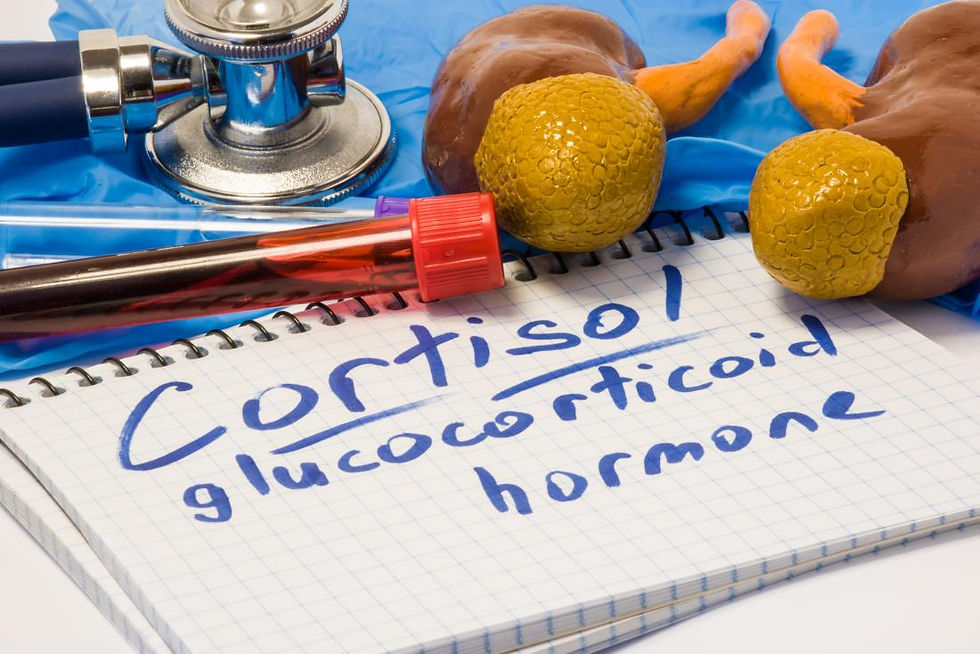Cushing's Syndrome and Diabetes
- Sarah
- May 26, 2023
- 2 min read

Cushing syndrome is a medical condition caused by high levels of the stress hormone, cortisol, in a person’s blood. Cortisol increases a person’s blood sugars and blood pressure. One of the major complications that may trigger unmanaged Cushing’s syndrome is diabetes. Cortisol promotes the liver to increase the levels of blood glucose. Individuals who have Cushing’s syndrome and are experiencing continually high cortisol levels might also experience blood glucose spikes. Hyperglycemia is associated with many chronic complications such as nerve damage, renal damage, heart problems, as well as bone and joint disorders.

Symptoms
● Acne
● Fatty tissue that accumulates around the upper back, waist, between the face and shoulders
● Inflammation on the cheeks with red patches
● Purple or red colored stretch marks
● Thin skin which gets bruised easily
Females might get ● Thicker than the normal body and facial hair and skipped or abnormal menstrual periods
Males might experience ● Trouble in attaining erections, loss of libido, and infertility.
Causes
Excess of the hormone cortisol in a person’s body results in Cushing syndrome. Cortisol is formed in the adrenal glands and plays a key role in a person’s body. For instance, cortisol aids in: ● Controlling blood pressure ● Maintains normal functioning of heart and blood vessels
● Lowers inflammation
● Stress response of the body
● Controls how the body converts food into energy
Types of Cushing’s Syndrome
There are two types of cushing’s syndrome- exogenous and endogenous. Exogenous is caused by corticosteroid drugs while endogenous is caused by the body’s own over production.
Exogenous
Cushing syndrome may develop from consuming oral corticosteroid drugs in high doses over time. Moreover, a person is likely to develop Cushing syndrome from injectable corticosteroids. Other drugs containing cortisol can result in Cushing syndrome, particularly when consumed in high doses.
Endogenous This problem may arise when the body produces either an excess of cortisol or an excess of adrenocorticotropic hormone (ACTH). This hormone is responsible for controlling the production of cortisol. This type of Cushing syndrome can also be associated with different tumors.
Clinical Manifestations
There is a range of metabolic changes that relate to Cushing’s syndrome such as: ● Central or abdominal obesity
● Type 2 diabetes
● Dyslipidemia
● High blood pressure
● Alterations in blood glucose metabolism
When combined, these features also constitute a metabolic syndrome. People with metabolic syndromes are at a greater risk of cardiovascular problems and stroke. In obese or overweight people or people with metabolic syndrome, too much activity of the hormonal signaling cascade causes cortisol production. This might be associated with modifications in the blood glucose metabolism, including insulin resistance. This can cause prediabetes or type 2 diabetes.
Complications of Cushing’s Syndrome
Without treatment, Cushing’s syndrome complications can include:
● High blood pressure ● Bone loss ● Loss of muscle strength and muscle mass
● Type 2 diabetes
Treatment
There are 3 main treatments for Cushing’s syndrome- surgery, radiotherapy, and medications. Studies have found that nearly 70% of people with both Cushing’s syndrome and hyperglycemia who have had curative surgery or radiation therapy saw considerably reduced levels of blood glucose.




Comments